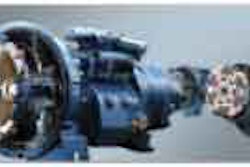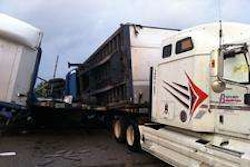
Being a fuel distributor can add to your bottom line
You try to save pennies in this business, because in high-volume transactions like fuel purchasing, the pile stacks up quickly as diesel prices climb (now above $4 a gallon.)
Shaving off a few cents per gallon from retail prices at truckstops with fuel cards and volume discounts is a start. For additional savings, technology can be used to find the optimal locations and quantity of fuel to purchase along a given route. Perhaps the best opportunity to maximize savings is by purchasing fuel in bulk.
The volume of fuel you buy is the main factor, but to squeeze out the last drop of savings, you also might consider becoming a licensed fuel distributor. You might think of a distributor as one who purchases fuel from bulk terminals (called racks) based on set volume contracts with suppliers, then sells and delivers product on its own fleet or through common carriers.
Fleets also are licensed fuel distributors and can do all of the above, including selling fuel to other fleets to build volume and using the margins to offset their own fuel costs. A distributor can take advantage of spot market pricing by going across state lines and exporting fuel to their state without paying taxes in both states.
If you buy enough volume – typically more than four truckloads a month – you might find a supplier willing to sell fuel to you directly. Also, if you operate one or more fueling sites within a region and use a combined 4,000 gallons a day (1.5 million gallons a year), becoming a distributor might be a viable option, says Robert “Bubba” Lange, an expert on energy tax regulations and compliance and senior vice president of operations for Zytax, a supplier of tax automation software for fuel suppliers and distributors.
Being a licensed fuel distributor is primarily a tax savings strategy, but carriers also gain some benefits by deferring the payment of taxes from their fuel spend. Currently, 31 states give distributors a shrinkage allowance that lets them deduct an amount from the total taxes paid on their diesel fuel purchases. This allowance is designed to provide relief for fuel lost in the transaction due to fluctuations in fuel volumes because of temperature. The allowance also helps offset the cost of collecting, filing and paying taxes to the state on the state’s behalf.
Volume is everything.
The allowance is a percentage of the total tax collected and varies by state. For instance, Nebraska’s shrinkage allowance is 5 percent on a tax rate of 26.8 cents per gallon. Texas has a 2 percent allowance on a tax rate of 20 cents per gallon. In the Nebraska example, the net tax savings would be 1.34 cents per gallon. This may not seem significant, but a large fleet with 1 million gallons of diesel a month could realize $166,800 of annual savings.
If you currently purchase fuel from a wholesale rack – or from a licensed distributor – you pay for state fuel taxes upfront with your fuel bill. The invoice terms from fuel vendors are tight – typically within 10 business days of delivery. But fuel distributors are able to defer payment of these taxes from 20 to 61 days as most states require payment on the 20th day of the following month. Using the Nebraska example, the amount of taxes you could defer for a truckload of product – say, 6,000 gallons of fuel – is $8,040.
Distributor expenses go beyond licensing, registration and bonding fees; they also include the overhead to manage fuel purchases, deliveries, invoicing and tax preparation. All of these functions and more can be outsourced for a flat fee, starting with the tax portion. Zytax is a wholly owned subsidiary of FuelQuest, a company that provides supply-chain automation software for fuel buyers. Its outsourced fuel management service and Software-as-a-Service product, Fuel Management System, can be used to create RFPs, lock in contracts, look for spot market opportunities, monitor tank levels and automate invoice reconciliation and payment.
As with most everything in business, volume is tantamount to savings. Even if becoming a fuel distributor is not a feasible option, you might at least consider joining forces with others in your position to build volume and gain the same advantages by creating a co-op scenario.
Aaron Huff is Senior Editor of Commercial Carrier Journal.
E-mail [email protected] or call (801) 754-4296.











